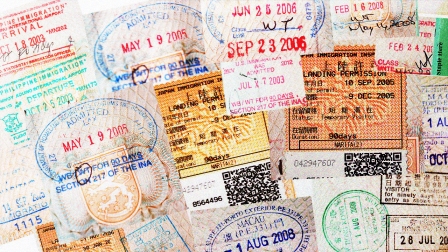Seven Jobs That Let You Live And Work Abroad (As Your Own Boss)
Right now, I’m sitting at a coffee shop in Bucharest, Romania, with my laptop and an Americano. For the past five months, I’ve been traveling through Europe and the Middle East while simultaneously building a marketing agency I can operate from anywhere in the world.
As many people are finding out, digital technology makes it easier than ever to work across borders. From Chiang Mai, Thailand, to Madrid, Spain, “digital nomad hubs” are popping up across the globe.
Freelancers and entrepreneurs alike are coming together to work outside the confines of traditional offices. And as remote work becomes more a norm than an exception, we’re likely to see more independent workers congregate even in cities where big industries and corporations aren’t anchored.
People I meet on my travels often ask me how I’m supporting myself and whether they can do it, too, using their own skills and backgrounds. The road to happy self-employment isn’t always as smooth as the one to a steamy espresso in Spain, but I’m living proof that it can be done—and so are the other digital nomads I’ve met who work in other fields.
Based on conversations with them and my own experience, here are seven professions you can pursue from just about anywhere.
1. Digital Marketer
If you’re passionate about social media or can’t get enough of launching pay-per-click campaigns, you don’t need a cubicle in an office tower to do that. Digital marketers (like me!) are finding the role lets us comfortably support ourselves from anywhere in the world.
“As a digital media professional,” Sharon Tseung tells me, “I’m currently managing email newsletters and paid ads for clients. I also blog about how to make money online while traveling.,” she says. “When I realized the living freelance expenses abroad were far less than San Francisco rent, working overseas was a no-brainer.”
With U.S. clients and Greek rent, Tseung has been able to fund her travels and embark on a full year (and counting) of remote work. From startups to Fortune 500 companies, there’s an array of companies that offer remote positions and are open to contracting freelance talent, particularly for marketing roles.
2. Public Relations Professional
A PR pro knows that early-morning pitching can make or break an outreach campaign. For me, I found that working from the Middle East gave me a big advantage since it put my schedule six hours ahead of my New York City clients.
In Tel Aviv, it was possible for me to build and execute media campaigns for clients based further west; all I needed was a stable Wi-Fi connection and an international clock. If you’re skilled in communications and can write a compelling press release, a career in public relations can be your golden ticket to a new adventure abroad.
3. Web Developer
The U.S. Bureau of Labor and Statistics has projected that employment of web developers is set to increase 27% between 2014 and 2024, “much faster than the average for all occupations.”
Many employers have turned to remote options for these needs, making a freelance career in web development a more feasible and remunerative option for remote workers than it was even a few years ago. Companies including Amazon, Dell, and IBM allow some developers to work remotely or on a freelance basis. As technology demand rises, companies are always on the hunt for talented web developers, no matter where they may be based.
4. Graphic Designer
If you dream in Helvetica and know your way around Photoshop, a career in graphic design can help you bring in the necessary cash flow to live and travel abroad. Glassdoor puts the average graphic designer’s salary at $61,192 in New York City, about $10,000 higher than the national median pay for the role.
But you may be able to do quite a bit better when you don’t have an HR department to negotiate your earnings with—and what you do earn may go further overseas anyway than it would in Manhattan. And one recruiter recently told Fast Company that design opportunities are popping up in industries where they didn’t much exist before. “You need a product that looks really good whether you are a software designer or a shoe manufacturer,” she said, which could be putting talented—if nomadic—graphic designers in higher demand.
5. Content Entrepreneur
Many digital nomads choose blogging as their revenue stream. Through paid sponsors, ads, and affiliates, it’s possible to generate thousands of dollars each year. Jason Wuerch, a content entrepreneur at Frugal for Less, recently chose to move operations overseas after he realized it was possible to work on his company while spending half as much money on rent as he would have in Portland, Oregon.
“My love of Europe combined with a smart financial decision made moving to Romania the right choice,” he told me. I can relate—it was a similar calculation that helped me make my own leap earlier this year. If you love writing but find that running a blog isn’t your calling, many writers find freelance work on platforms like UpWork, Fiverr, and others.
6. E-Commerce Entrepreneur
Got something to sell? You can probably sell it while working abroad, even if your target customers are back home. The U.S. e-commerce sector grew 14.6% in 2015, making it a ripe market for digital entrepreneurs. It depends on what you’re selling, of course, but all you may really need is a Wi-Fi connection and a distribution partner for fulfillment. (Even if you’re making a product that requires you to stay in one spot, production costs are still lower in many places overseas than they are domestically.)
With a few weeks’ time and a touch of creativity, you can create your own digital business, whether it’s a line of jewelry, phone cases, or even kitchenware. And even if you aren’t producing your own goods and selling them online (which can require more of a full-fledged operation), creatives around the world are earning passive income and supporting their travels through sites like Etsy and Zazzle.
7. E-Learning And Video Expert
Over the past decade, video technology has given rise to education platforms like Udemy and Skillshare. Entrepreneurs can now create and sell a course on an unlimited number of topics.
Whether you’re a doctor, lawyer, or restaurant server, as long as you’ve got some kind of useful instruction to give, you can build a course that’s relevant to your industry and get paid to show others the ropes by video. And if you’re skilled at widely available tools like Final Cut Pro, a career in video production or e-learning might be for you.
Derek Merdinyan of Video Igniter made the plunge into digital nomadism almost five years ago. “I’ve done the calculations, and running my business remotely means I have lower overhead costs and can pass the savings on to my clients,” he says.
Digital media is here to stay and, increasingly, a viable way of supporting yourself abroad in a range of industries. From public relations to graphic design, these cross-border career paths can help fund the expat life you’ve been dreaming of.
Arianna O’Dell is the founder of Airlink Marketing, a digital agency that helps hotels, restaurants, and travel destinations attract and retain clientele.
Fast Company , Read Full Story
(35)













